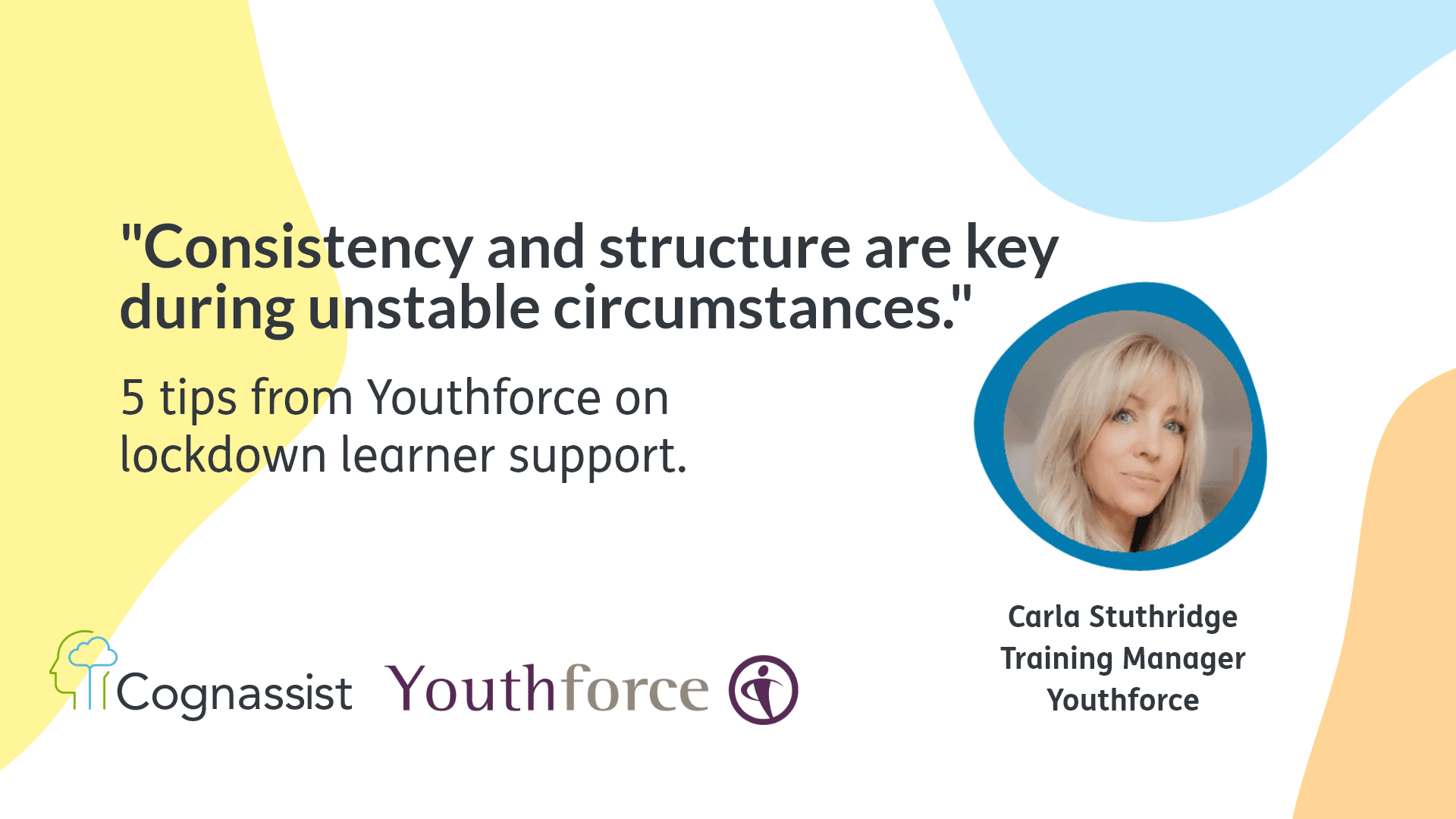
5 top tips from Youthforce
Youthforce joined Cognassist during lockdown #1 and have focused on supporting both learners and staff throughout this tumultuous time. Read on to find out their 5 top tips for surviving lockdown.
Youthforce are an independent training provider focused on changing lives through science and technology apprenticeships. Last March (on the 20th to be exact – 1 week before the first lockdown hit), Youthforce went live with Cognassist. This may seem like odd timing to introduce a brand new software and support solution but in reality, it was great timing.
We recently sat down with Training Manager Carla from Youthforce to discuss the adjustments they have made throughout the pandemic.
Carla explains that they were already on the path to moving online but back in March 2020 they received the urgent push they needed to get it done. They were already using Moodle for their provision and were able to pivot quickly to provide a fully online delivery.
Here are some top tips from Carla about how they’ve adapted throughout lockdown to support both learners and staff:
1. Daily huddles
“We’ve always run daily stand ups but during lockdown these provided a new lifeline for the whole team. It’s a great way to start the day!”
Carla explains there was a keen focus on ensuring the team still felt connected even when apart. The daily huddles involved every Youthforce team member and they created a great opportunity for team members to put a smile on each other’s faces throughout all that the lockdowns have brought.
During the huddles each member shares their three priorities for the day, aiding collaboration and communication across the team.
Occasionally, they would have extended huddles with activities including chair exercises, mindfulness and team building activities.
Carla tells me they’ve onboarded 13 new members of staff since March 2020. Due to the daily huddles all new joiners know exactly who to contact in different sections of the company and have the confidence to reach out, even if they haven’t met any of their new colleagues in person.
2. Catch up cadence
BC (Before Covid), Youthforce tutors would visit apprentices at work every 6-8 weeks. Now, they’ve switched to a more modular approach and increased the regularity of the check-ins.
Each block of learning is now 10 weeks and the tutors hold an informal catch up at 5 weeks so they can check in with the apprentice. The 10 week catch up is the formal progression review.
These include their Cognassist catch up where tutors and learners discuss the support strategies from that month and the impact they have had.
Carla notes that with the new layout of the Cognassist notes function, these conversations are clearly structured for the tutors.
“We’ve found the learners respond really well to having these check-ins booked in their calendar in advance. They know what to expect when and can look forward to the catch ups with their tutors.” Carla explains that this level of consistency has had a really positive impact on their apprentices.
3. Furlough provisions
Carla tells me they really wanted to ensure that apprentices who had been furloughed still felt supported by Youthforce. They hosted drop-in support sessions for anyone to join as well as activities including mindfulness and time management.
Monthly Cognassist support sessions were also provided for furloughed apprentices and Carla tells me this was a great source of consistency and comfort for those on furlough. The topics and support strategies kept the apprentices connected to their learning, even if it wasn’t subject-specific.
4. Team meetings
As well as adjusting the cadence of their learner catch ups, Carla’s team also revisited their internal meeting schedule.
Carla now catches up with each team member fortnightly as well as getting the team together once a week. She tells me they’ll definitely be continuing the fortnightly one-to-ones once we get back to whatever normal is.
The weekly team meetings have also become more important, Carla explains, and are the front line of defence against learners slipping through the net.
During these meetings they talk through learner engagement and progress, using various data points to measure the two. Moodle and Cognassist engagement are key indicators of how a learner is getting on.
5. Stick to the plan
If Carla could travel back to March 2020 and give herself one piece of advice, it would be to make a time management plan… and stick to it.
“You have to be strict about closing the laptop and ending your workday.”

Carla Stuthridge
Training Manager, Youthforce
We all know how the line between work and leisure blurs when working from home but short term self-discipline is essential for long term self-sustainability.
At the time it seems like a small thing, but the extra hours quickly build up. It’s important to put parameters in to look after yourself.
So there you have it, 5 practical tips from our wonderful client Youthforce. It’s clear that consistency and structure have been key to supporting apprentices throughout lockdowns. Carla highlighted that the personalised learning strategies that Cognassist shares on a monthly basis helped form this reliable support structure for their learners.
Are you looking to bake in regular and consistent student support structures to your organisation? If yes, get in touch today to book your Cognassist demo.
If you’re interested in scaling up your learner support, book a demo with us today.

Bryony
Marketing and Events Manager